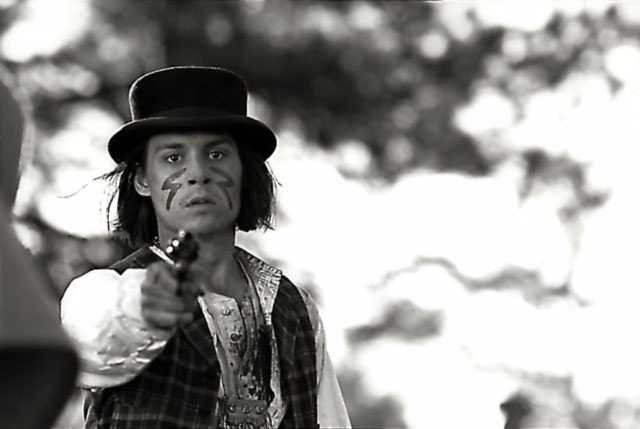
Go Jarmusch, go Jarmusch, go!
Well, he finally won me over. Dead Man is an excellent, offbeat drama/western with occasional dry wit common in Jarmusch films. The film started off very strange and included a series of events that led me to think the film was going to be a kin to Scorcese's After Hours. Dead Man ended up being a little less out there (although it tip-toed on that fence the whole time) than Scorcese's film. Still, Dead Man includes an Indian named Nobody, a cannibal assassin, a gun happy lumber yard honcho, and Iggy Pop in a bonnet and dress.
Dead Man is simultaneously a trademark Jarmusch film and a huge leap forward in quality for the director. A bigger budget, a professional cast, wonderful cinematography, and a more plot-based script than any of the other Jarmusch films that I have seen make for a fantastic movie. None of these things necessarily makes a great film. But, in the case of Dead Man, all these things gel together to create a very, very good movie.
The story is about William Blake (Johnny Depp), an accountant from Cleveland traveling out West to start a new job at a lumber mill. After a series of misunderstandings, he's shot and running from the law and the wrath of Dickinson (Robert Mitchum), a strange businessman, who hires three gunslingers (Michael Wincott, Lance Henrikson, and Eugene Byrd) to bring Blake back dead or alive.
Blake is saved by an Indian named Nobody (Gary Farmer) who speaks in mystical nonsense or plain common sense and believes that William Blake is the same man as the poet whose works he has read. "Did you kill the white man that killed you?" Nobody asks. "I'm not dead," Blake answers. "Am I?"
The film plays with that question. Nobody sees Blake as a skeleton after indulging in peyote. Blake continuously drifts in and out of consciousness for much of the movie. The question isn't exactly the meat and potatoes or sole source of meaning for the film, but does set up much of Nobody and Blake's interactions as well as a e ending.
The ending is anticlimactic, but in a very ironic way that fits the tone of the movie and left me mostly satisfied. Still, I somehow think the ending was not enough to finish the grand, strange journey there. I think the ending was saying something that lost me in translation. If you're listening Jim Jarmusch, what is your point? Or am I supposed to decide? Because that very well may be.
In Stranger than Paradise and Down by Law, Jarmusch wasn't exactly trying to tell me anything other than people are strange. I think he's also saying that in Dead Man, but there's something else, something that I'm missing.
While Blake is on the lam, he has run-ins with unique characters. He happens upon a group of weirdos (Billy Bob Thorton, Iggy Pop, Jared Harris) at a campfire. He faces two marshalls out for the reward for Blake. And in a great scene, he meets a narrow-minded, bigoted, fire-and-brimstone priest running a trading post out in the middle of nowhere. By this point, Blake is a famous outlaw and has become an excellent shot and more hardened man. When he is challenged, he lays waste to the men around him. "I'm tired," he says. It's more informative and conversational than a voice of inner turmoil.
It's an example of Jarmusch's handling of the drama and wit of his western. It's not like any movie in the genre that I have ever seen. While it stands out amongst its peers, I never felt that it was crazy and strange just for the sake of being crazy and strange. Maybe this is because Jarmusch's zaniness is so relaxed and non-chalant that it's easy to look over unless you're tuned into his vision and tone.
Depp and Farmer are excellent. Their scenes together are some of the best in the film. Depp starts off bright eyed and soon can't seem to keep his eyes open. Blake becomes just the kind of man everybody mistakenly thought he was in the first place. Nobody explains the change matter-of-factly as though no change has occurred at all. This new Blake was expected by Nobody all along and it seems there are no real surprises in Blake's journey back to where he came from. And when he gets there, there is beauty in the strangeness of the moment unlike all the strangeness that Jarmusch has unleashed in all the other movies of his I has seen.
Depp's seamless transformation and quiet meditations are perfectly portrayed. I would have become endlessly bored by his constant drifting in and out of consciousness if he and Jarmusch didn't make every moment he was awake so priceless. It's a startling performance because of Depp's ease moving between strange, dry wit and gun-toting bad ass.
Farmer, whom I think I've only seen before in a minor role in The Score, is wonderful. In some ways, Nobody is a stereotypical Indian guide like we've seen before in film - the wisdom of the rustic. But in some ways, he also has the strangest wit of all the characters. He leads the journey, but in some ways he's unconcerned how Blake gets there.
All is I know is that I really enjoyed the trip.
****


No comments:
Post a Comment